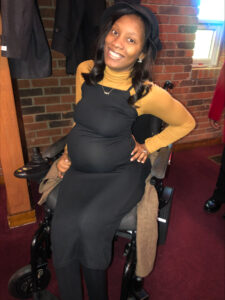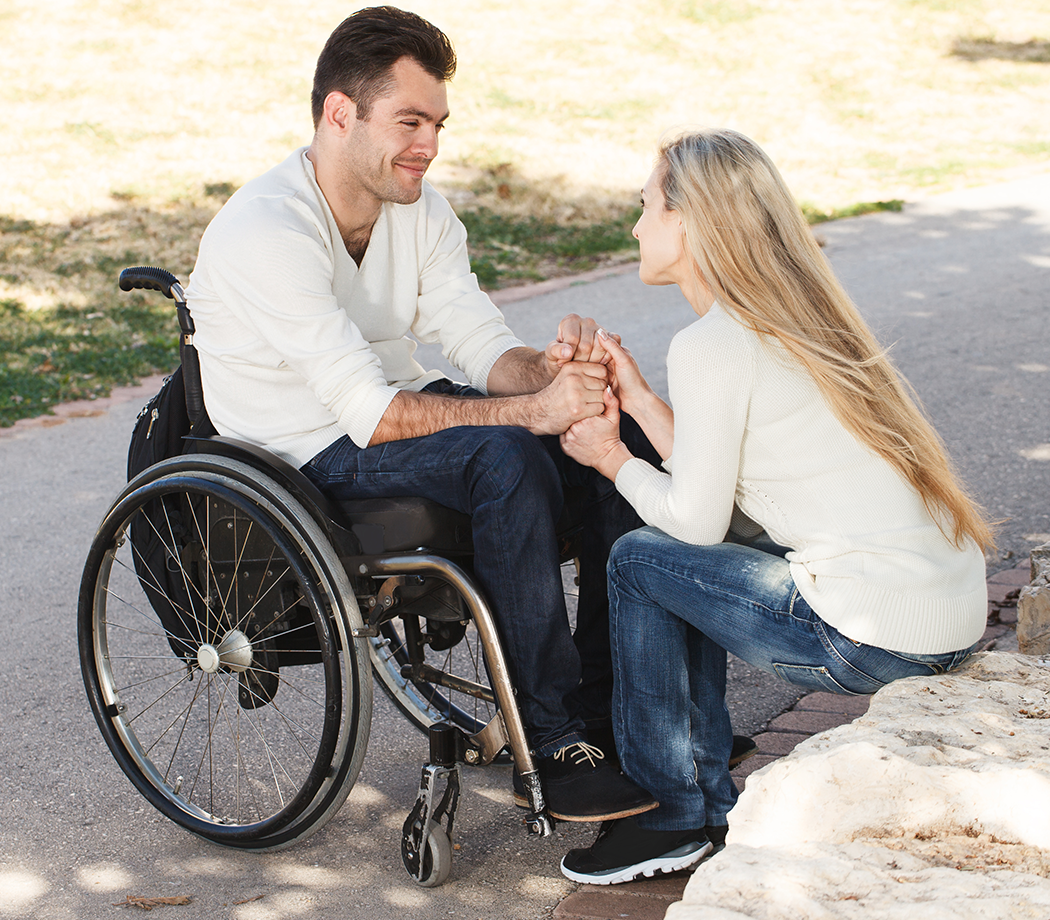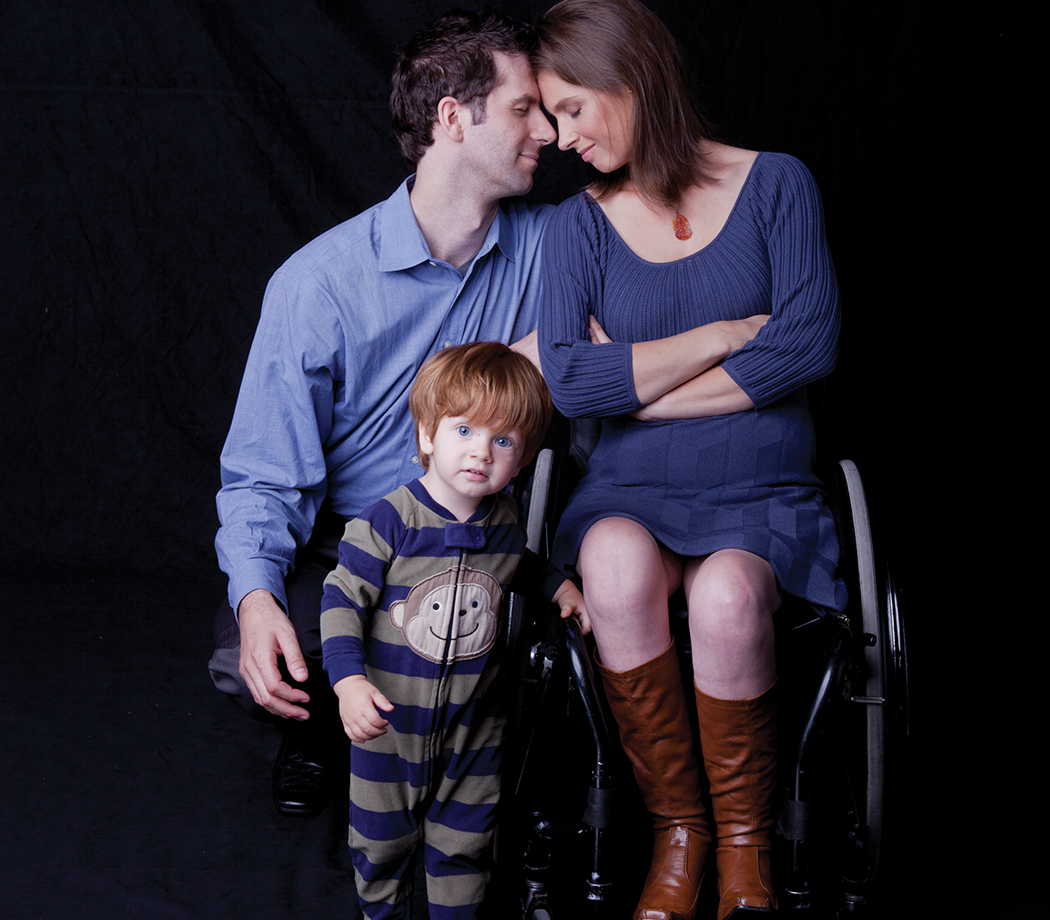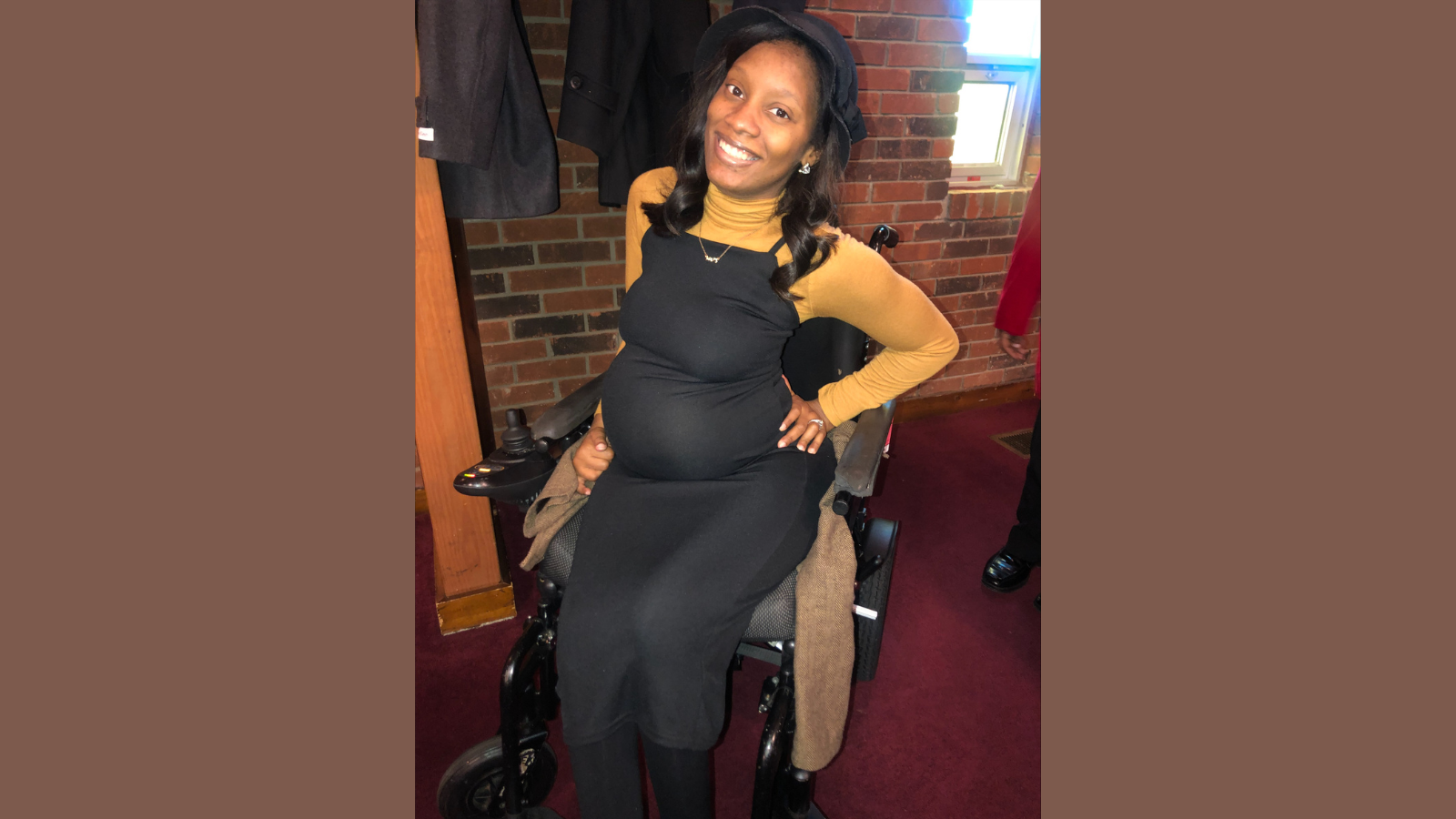Pregnancy and Paralysis
 Paralysis does not prevent a woman from becoming pregnant and having a baby. Morning sickness, headaches and swollen ankles are among the familiar and normal side effects of pregnancy that women with spinal cord injuries are as likely to experience as anyone else.
Paralysis does not prevent a woman from becoming pregnant and having a baby. Morning sickness, headaches and swollen ankles are among the familiar and normal side effects of pregnancy that women with spinal cord injuries are as likely to experience as anyone else.
But pregnancy will amplify secondary health conditions, including urinary tract infections, pressure injuries and spasticity. To mitigate risks, women living with paralysis who become pregnant should ensure the best possible care by finding doctors who are familiar with spinal cord injuries. The more knowledgeable the individuals overseeing the pregnancy are, the better served mother and baby will be.
Seek out obstetric referrals from other parents with disabilities or from physiatrists, rehabilitative doctors who treat medical conditions related to the brain, bones, nerves and muscles, including those sustained through spinal cord injury. The American Academy of Physical Medicine and Rehabilitation provides a searchable database of practicing members throughout the country.
A high-risk obstetrician might be best equipped to manage comprehensive care for pregnant women with spinal cord injuries. Physiatrists, respiratory therapists, physical therapists and occupational therapists can also help monitor and address additional changes to overall health caused by pregnancy. Be sure new doctors are aware of all underlying health conditions and current medications; adjustments to prescriptions may be needed during pregnancy to ensure a healthy baby.
Related Content:
Dr. Harris spoke with the Reeve Foundation about the importance of preconception health, what to know about pregnancy and paralysis, and how healthcare providers can provide accessible care.
Pregnancy and Spinal Cord Injury: Anna Holly’s Story
Secondary Conditions and Pregnancy
There isn’t one definitive guide to pregnancy. Everyone has a different experience, but all women living with paralysis should understand and anticipate potential complications stemming from existing health issues.
A range of secondary conditions — including increased spasticity, constipation, and stability challenges — can develop alongside the typical symptoms of pregnancy. Multidisciplinary teams of healthcare professionals, including obstetricians, physiatrists, urologists and occupational therapists, can help patients monitor and manage these conditions.
Bladder health is critical for people with paralysis, and one of the most common complications in pregnancy. Before becoming pregnant, it’s a good idea to get a baseline checkup of the kidneys, bladder and ureters; this will help doctors monitor any changes that occur during pregnancy. Pregnant women should be especially alert to urinary tract infections, as they can cause early labor. During pregnancy, a growing baby bears down on the bladder, leaving less
room for urine to gather. Bladder programs may need to be adapted to increase frequency and use of intermittent catheterization. At some point, it may be necessary to use an indwelling catheter to continuously drain urine.
Blood clots can also be an issue. By the third trimester, doctors will likely be closely monitoring an expectant mother’s breathing and circulation. The additional weight of a baby can slow blood flow; wearing compression stockings and elevating feet when possible is recommended.
Weight gain throughout pregnancy may affect function and independence, making it more difficult to transfer and increasing the risks of falls. While moving can become cumbersome, it is important to be conscious of regularly shifting body position; examine skin often in order to prevent pressure wounds, especially if bed rest is prescribed. Additionally, some women with muscle atrophy will be at risk for pathologic fractures; transfers should be undertaken carefully at this stage.
Autonomic dysreflexia (AD) will pose a risk for pregnant women with spinal cord injuries above the T6 level. This potentially life-threatening condition, triggered when the body feels pain below the level of injury, causes dangerously high blood pressure and its symptoms, including painful headaches and nausea, can be mistaken for routine side effects of pregnancy. It can also present similarly to preeclampsia, a high blood pressure disorder that can develop during pregnancy; both conditions can cause high blood pressure and headaches.
It is critical that doctors understand how to identify and treat autonomic dysreflexia throughout pregnancy, but especially in the third trimester and during labor, when it is most likely to occur. Potential AD triggers during pregnancy may include cervical examinations and uterine compressions during ultrasounds.
The Reeve Foundation offers free AD wallet cards containing baseline blood pressure, level of injury, and emergency contact information to carry and share with healthcare providers. The card can be downloaded from the foundation website at or sent by mail. Contact the National Paralysis Resource Center at 800-539-7309 to request a copy.
Labor and Delivery
Early in the pregnancy, create a delivery plan with your doctors. Vaginal delivery is possible for women with spinal cord injuries. Plan to attend a birthing class. Visit the hospital and speak with staff ahead of time to make sure it is fully accessible and prepared for labor issues unique to patients with paralysis and spinal cord injuries, including autonomic dysreflexia. Consult in advance with providers about anesthesia; patients with spinal cord injuries should be under the care of anesthesiologists with expertise in obstetrics.
Women with paraplegia will be able to learn how to feel the uterus to monitor labor; those with quadriplegia may need to use a contraction monitor at home. Women with limited uterine sensation should receive weekly cervical exams beginning at 28 weeks and be admitted to the hospital once cervical dilation or effacement begins.
During labor, women should be repositioned every two hours to prevent pressure injuries. Blood pressure, heart rate and body temperature will need to be monitored, and doctors and hospital staff should be particularly alert for signs of autonomic dysreflexia (AD), even if it did not manifest earlier during pregnancy. Continuous epidural anesthesia may be recommended in order to prevent the onset of AD.
Postpartum Depression
Postpartum depression is a common and serious medical condition that affects roughly 1 in 8 women. While many women will experience the ‘baby blues’ – increased crying, restlessness and anxiety caused by changes in hormonal levels after delivery – these feeling usually go away after a couple weeks. The symptoms of postpartum depression can last for months and are more intense, severely impacting overall physical and mental health. Postpartum depression often occurs after delivery, but depression can also develop at any time during pregnancy.
Women with disabilities face a higher risk of developing depression and anxiety than women without disabilities. Risk factors for developing postpartum depression include a history of depression, physical abuse during pregnancy, medical complications during pregnancy (including emergency cesarean section), and a lack of support from family and friends.
Symptoms of postpartum depression may include:
- Increased crying
- Feeling angry, worried, or overly anxious
- Feelings of hopelessness
- Withdrawing from loved ones
- Difficulty sleeping
- Eating more or less than usual
- Feeling distant from your baby
- Doubting your ability to care for your baby
- Thinking about hurting yourself or your baby
If you experience these symptoms, contact your doctor or healthcare provider immediately. Postpartum depression can be treated. Depending on the severity of the case, a combination of medication and therapy may be recommended.
Along with treatment, support groups may also be helpful. Check with your doctor and local hospital to see what is available in your community. Postpartum Support International, a nonprofit organization founded in 1987, offers free virtual support groups, weekly chats with licensed mental health professionals, a peer mentor program, and links to local providers who treat postpartum depression. For more information, visit its website here.
Support Networks
Building a network of support, both in and out of the home, is important for expectant mothers. Seek out local playgroups, but also join online message boards used by parents with disabilities. The National Research Center for Parents with Disabilities at Brandeis University offers online resources including webinars, how-to videos and community blogs tackling topics ranging from adaptive technology to managing nighttime feedings.
The National Paralysis Resource Center Peer & Family Support Program can match parents, including those who are expecting a baby, to community members with similar experiences. Connecting with other parents with disabilities can help overcome doubts, boost confidence and serve as a real-time reminder of all that is possible.
For more information about the program, visit Peer & Family Support Program or contact our Information Specialists at 800-539-7309 for more information.
And while stocking your shelves with parenting books that suit your style, include the Reeve Foundation’s free Parenting with Paralysis booklet. Download the booklet here or contact the National Paralysis Resource Center at 800-539-7309 to request a copy by mail.
Parental Rights
People living with disabilities have achieved significant gains throughout the last half century. In that time, the Rehabilitation Act of 1973 (Rehab Act) and the Americans with Disabilities Act of
1990 (ADA) became cornerstones of a legal framework that not only prohibits discrimination in housing and employment practices, but also protects the civil rights of those living with disabilities.
However, despite the intent of these laws, parents with disabilities continue to face discrimination and bias from medical and government agencies; understanding your rights as a parent is critical.
Beginning with conception efforts, the rights of people with disabilities are protected. If you experience fertility issues while trying to become pregnant, you have the right to access in vitro fertilization or other assistive reproductive technologies. Doctors providing these treatments must comply with the ADA and, if they receive federal funding, the Rehab Act.
Similarly, the ADA and Rehab Act apply to both public and private adoption agencies, specifically prohibiting discrimination against prospective adoptive parents living with disabilities.
If you become a parent, the Reeve Foundation’s Parenting with a Disability: Know Your Rights Toolkit provides an overview of disability law and the safeguards that exist to protect your rights as a parent, including information on adoption, custody, visitation law, family law and the child welfare system. Copies can be downloaded here. Or call the Reeve Foundation’s National Paralysis Resource Center at 800-539-7309 to have one mailed to you.
Additional Resources
Center for Women with Disabilities at the UPMC Magee-Womens Hospital: Obstetrics and Gynecology Services
Craig Hospital: Sexual Function for Women After Spinal Cord Injury
Craig Hospital: Pregnancy After Spinal Cord Injury
Model Systems Knowledge Translation Center: Pregnancy and Women with Spinal Cord Injury
Rocky Mountain MS Center at University of Colorado: Family Planning with MS Webinar
Shepherd Center: Women’s Health Resources and Video Series (including pregnancy)
Spina Bifida Association: Health Care for Women
Triumph Foundation: Sexuality and Sexual Functioning Resource List
Support Groups and Resources
Christopher & Dana Reeve Foundation Peer & Family Support Program
Find one-on-one peer mentor support from community members with similar injuries and experiences:
Craig Hospital Childcare Resource Group for Prospective and Current Parents with SCI
3425 S Clarkson St.
Englewood, CO 80113 (303) 789-8000
A private Facebook group for women with spinal cord injuries to discuss pregnancy, labor, delivery and parenting.
For Healthcare Providers:
Craig Hospital: Pregnancy after Spinal Cord Injury for Healthcare Providers
A Primary Care Provider’s Guide to Clinical Needs of Women with Spinal Cord Injury
Slocum C, Halloran M, Unser C. Topics in Spinal Cord Injury Rehabilitation, 2020 Summer; 26(3): 166–171.
Sources: American College of Obstetricians and Gynecologists, Model Systems Knowledge Translation Center, Craig Hospital, Shepherd Center, Centers for Disease Control and Prevention, U.S. Department of Health and Human Services Office on Women’s Health, Johns Hopkins Medicine.



